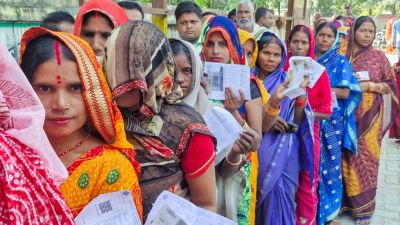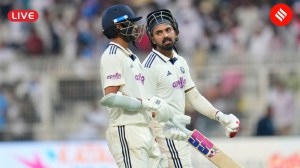Dangal 2.0: How ‘fearless’ Vinesh Phogat’s election campaign is shaping up
Vinesh Phogat is many things to many people: the face of Indian wrestling and the face of protest. But for the women of Haryana’s Julana Assembly constituency, she is what they want their young girls to be — fearless.
 Vinesh Phogat at her rally in Julana (PTI)
Vinesh Phogat at her rally in Julana (PTI)A RUSTY old weighing machine stands not too far from where the hookah-smoking men, in their starched pink turbans, and a group of veiled women are waiting for Congress candidate Vinesh Phogat. The day’s humidity is stifling, yet every open-drained lane leads to the community hall in Ramkali, a village of 1,500 people in Haryana’s Julana assembly constituency that votes with the rest of the state on October 5.
In the courtyard, sarpanch and farmer Ramtirath Singh is making enquiries about the 50 kg of desi-ghee boondi laddoos he has ordered. “We will distribute laddoos equivalent to her weight today. I told Vinesh, ‘Beti, tu vajan badha ke aana (Don’t worry about your weight). Over 5 kg of laddoos are on stand-by. We are not like those people in Paris,” he says.
The mention of the Paris Olympics — where Vinesh was disqualified on the morning of her 50-kg final event after she failed the weigh-in by a mere 100 gm — changes Ramtirath’s mood. “Bhaisaab, sarkar ne saath nahi diya (The government didn’t support her). Just 100 grams? They should have done more.” Ramtirath believes the onus is on Julana now. “The world is watching us. It’s our duty to stand by her.”
Meanwhile, in the distance, the din of Vinesh’s campaign cavalcade chips away at the tranquil rural air — one decibel at a time. It turns out to be a Haryanvi song that recently went viral — about Vinesh’s protest against the then wrestling federation chief Brij Bhushan Sharan Singh, her Paris heartbreak and the alleged government inaction.
All through the current election campaign, this song — a synopsis of her eventful last couple of years — has been the ballad that has announced her entry. It is also her pitch against the ruling BJP.
“Karo swagat sherni ka, aa ladke aayi se Sarkar ko samajh mai aayi na, chhori ke sapne maar diye
Maari Vinesh Phogat toh haar ke jeeti chhe…”
The song blames the government for failing to support the “lioness” who raised her voice against exploitation. It also sympathises with the girl with shattered dreams who “won even in defeat”. Sung in a folksy Ragini tune, it’s an apt election anthem — the kind that gets stuck in your head.
As Vinesh emerges through the sunroof of her SUV, the women form a neat queue in the compound. Little boys, unattended now, run around with flags, dancing to the tune of the song. The girls are better behaved, tailing their mothers and waiting in the queue with rose petals in their tiny clenched fists.
Vinesh gets weighed, the extra 5 kg laddoos are needed. Now the old men take a break from the hookah huddle and walk on to the stage to place their pink pagdi on Vinesh’s head. The announcers identify each of the elderly men by their names and castes and declares that all 36 caste biradaris had thrown in their lot with the Congress candidate. Vinesh in pagdi smiles, the women clap the loudest.
In these parts, it is easy to distinguish the bahus from the betis – the daughters don’t cover the faces while the daughters-in-law are mandated to hide behind the ghunghat. All except one.
Married to a Julana boy and national-level wrestler Somvir Rathee, Vinesh, for the record, is a bahu here.
 Since the start of the campaign, she has been spending about 12 hours on the road daily, from 9 am to 9 pm. (Express photo by Nihal Koshie)
Since the start of the campaign, she has been spending about 12 hours on the road daily, from 9 am to 9 pm. (Express photo by Nihal Koshie)
Election posters call her Vinesh Phogat Rathee. To the world, including Julana, she is much more. Vinesh defies all gender stereotypes associated with the state that has traditionally struggled with a skewed sex ratio. She is the face of Indian wrestling, the face of protest and the face of change. She can’t be under a veil.
Over the years, this region is liberal when it comes to wrestlers. Like men, women from the akhadas too are revered. The other day, when Vinesh was felicitated at her village, the sarpanch, a young mother, couldn’t make it to the function. However, she did ask her husband to get the star wrestler’s blessings for her son and also get her to touch her new-born daughter’s jabla (baby garment). “That would give her the same courage as Vinesh,” she said.
Pehelwan ji’s love story
In this state, pehelwan ji is a gender-agnostic title of honour. This is a learning from the Vinesh-Somvir meet-cute from their teen days. Vinesh throws back her head and laughs when she is asked how she met Somvir. Suddenly, the fatigue of the long, draining day disappears. It was in 2011 that Somvir tried and managed to get Vinesh’s number from her friends. Little did the love-struck wrestler know that Vinesh used her mother’s phone.
 Little boys, unattended now, run around with flags, dancing to the tune of the song. (Express photo by Nihal Koshie)
Little boys, unattended now, run around with flags, dancing to the tune of the song. (Express photo by Nihal Koshie)
Over to Vinesh. “He called and said, ‘Pehelwanji, mujhe friendship karni hai aapse (I want to be your friend)’. I quickly cut the call as I didn’t want mummy to hear what he said. I messaged him — ‘This is my mother’s phone. Aaj ke baad phone kiya toh teri haddiyan tod dungi (If you call again, I will break your bones)’,” she recalls. “He didn’t call for the next two years but would send me a shayari (poem) every morning. I used to read them. I didn’t reply, but I didn’t block him either. I started looking forward to his messages after a point.”
With time, pehelwanji would agree to the friendship request. They would get married, spend a few days in Julana and be the globe-trotting husband-wife team — from wrestling halls to Jantar Mantar, the site of the 2023 protest against the alleged sexual harassment of women wrestlers. Somvir was by her side when she took on Brij Bhushan. He would also make her do the impossible — train to be fit for the Olympics despite losing valuable time fighting traumatic off-mat battles.
Vinesh would mention this in her long social media post in which she announced her retirement after the Olympics. Somvir was her “soulmate, companion and best friend for life”. She also wrote how he had “sacrificed at each step, taken my hardships, shielding me always”.
Somvir isn’t by Vinesh’s side today. He is manning the election office and also engaging the voters, going door to door. When someone asks about him, she says, “He is more busy than me. If you phone one of us, chances are I will take the call, he doesn’t have time.” This is a very different Haryana story.
‘We want to be like didi’
The convoy moves to the next stop. Vinesh looks vacantly as the young and old chase her car, banging on the glass to get her attention. She points to the commotion around and gets philosophical. “This is God’s will, I am just following my destiny.”
“During the Olympics-qualifying window, I don’t know why, but I started buying suits (salwar-kameez). I like to binge shop… and I ended up buying 80 to 90 suits from different online shopping platforms. People at home were getting fed up, there would be a courier for me almost every day. Now, the suits have come in handy… there are rallies every day,” says Vinesh, who is today dressed in a floral bottle green salwar-kameez.
 Vinesh’s presence in the political arena is a significant shift for a region with negligible female representation in decision-making.
Vinesh’s presence in the political arena is a significant shift for a region with negligible female representation in decision-making.
Driving Vinesh’s car is Somvir’s brother. Behind the wheel, he is a master. He can parallel park even in the tightest of spaces, squeeze the brand new SUV on lanes made for bullock carts that move lazily.
As Vinesh, sitting on the front seat, is engrossed in conversation, Somvir’s brother reminds her that they are approaching the next village. That’s a cue to start her routine. She waves at the women on the terraces, the ones peeking behind barely open doors and the men sitting on chairs outside their homes.
Out of nowhere, a girl, barely in her teens, runs towards Vinesh. The car stops. She has short hair, the kind wrestlers sport. “Didi, aapki jeet guarantee hai. Aap chinta mat karna (You are winning, don’t worry),” she says, handing her a chit and a pen for an autograph. Vinesh cups the child’s face and pens her a message. The convoy moves but the fan-girl keeps gazing at Vinesh, who is now perched on the car roof.
Vinesh gets that dreamy gaze from young girls everywhere. At virtually every public meeting — be it in a small temple compound at Shamlo Kalan or a pokey sarpanch office at Khima Kheri — girls sit cross-legged on the floor in the front row. They look up at her, hang on to every word she says. They are shy but do say “Didi jaise banna hai (have to become like Didi)’. Vinesh loves talking to them. “That’s the most heartening aspect of this campaign for me. They share their dreams with me. I know a lot needs to be done for them,” she says.
‘Our girl fought against them’
The next stop is Shamlo Khurd, a quaint village of just 800. Here the meet-and-greet is in a room half the size of a badminton court. The ceiling has slots for six fans — but only the one over Vinesh is making lazy circles. Sarpanch Gobind says he wants to promote Prime Minister Narendra Modi’s Digital India plan in his village. Gobind claims to have done a lot of work for the village.
Gobind says his village will ensure “ek tarfa jeet (one-sided win)” for Vinesh. In return, the one-time wrestler promises sporting infrastructure in the village. But the Vinesh aura touches women differently.
As the candidate leaves, a small group of anganwadi workers prepare to return to work. They too mention the need for a wrestling arena for their daughters. Anganwadi worker Sunita wants the daughters of the village to be like Vinesh. “Hamari bachchiyan bhi khelengi. Aisi himmat wali beti chahiye, aise sanskar wali beti chahiye (Our girls will also play. We want the daughters of the village to have the same courage and values),” she says.
 Vinesh gets that dreamy gaze from young girls everywhere.
Vinesh gets that dreamy gaze from young girls everywhere.
After a brief stopover for lunch next to a slushy paddy field, the bandwagon trudges towards Kishanpura. The turnout here, by village standards, is massive. There are close to 30 rows in the women’s section, each with at least 20 chairs, and they are all occupied. Vinesh goes to each one of them for blessings before taking the stage.
She does this effortlessly — she is used to fighting three bouts a day and a final on Day 2. Once done with the feet-touching, she sprints down the aisle and jumps onto the stage. She’s an Olympian, her body is trained for such physical activity but the throat can’t take the strain of endless speeches. While in the car, she had been constantly popping tiny mishri cubes – the transparent sugar candies that are popular as temple prasad. “This is soothing … aur meetha bhi bolna hai (I have to talk sweetly). After all, I am a politician now,” she jokes.
On the stage, after the initial greetings and her “aapki bahu ko jitana hai (ensure your daughter-in-law wins)” appeal, Vinesh’s voice gives up. The crowd is understanding, almost indulgent.
“Waise bahut achha bolti hai but aaj gala baitha hua hai, kya kare (She speaks really well but today her throat is sore),” an elderly man says. She’s their girl and they have her back.
Vinesh’s hoarse voice is a worry since up next is the biggest rally of the day — at Anoopgarh village. It’s in an open, untilled field. Vinesh makes a call to the area’s seasoned orator, Congress worker Ranbir Narwal. He is quick to react and is on the stage facing a teeming mass of men in their best whites and women in their sparkling saris. Eight tractors stand guard at the rear of the shamiana.
Narwal’s speech is riveting. He knows his pauses and punches. He talks about why Vinesh joined politics. “After God, it is raj (power) that is the most powerful. Vinesh will write the fate of your children. It’s for the first time in this area that a ticket has been given to a woman, the izzat (honour) of your beti (daughter) and bahu (daughter-in-law) is in your hands,” he tells the crowd.
As his speech winds up, he ups the melodrama. “She will protect your daughters from the darinde (villians) who are sitting at the top to claw them. Vinesh fought them, our girl fought them, you should be proud of her, you should vote for her,” he concludes.
At one point, Narwal gets carried away. “Make her win by such a big margin that the Hoodas makes her not just a sports minister but home minister.” The crowd goes wild.
Farmer leader Narendra Tau is from Meerut but has made the trip to Julana to lend his support to Vinesh. He was also at Jantar Mantar. Tau is outraged when asked if Vinesh should have stayed away from politics.
“Why was she dragged on the streets of Delhi? Because of politicians drunk on power. If she is elected to power, she will use that to uplift women and those who are vulnerable. She will make a good politician. She’s already looking the part, isn’t she?”
A new fight, a new story
It is said in these parts that governments are made and destroyed every evening at the village square over puffs of the hookah that gets passed around. At one such huddle, the debate is getting heated. The oldest of the lot seems a Congress sceptic. He is proud of Vinesh the wrestler but isn’t sure about Vinesh the politician.
When someone asks, “Can Vinesh be a good politician for the region?”, he responds with “Yeh lugaiyon ko kaun samjhayega (Who will make the women understand)”. It’s a statement vague enough to leave seasoned election reporters confused.
What’s evident, though, is that Vinesh’s presence in the political arena is a significant shift for a region with negligible female representation in decision-making, both at homes and inside the House. Will Julana’s story finally will be told by the women in veils, the mothers of young girls with a dreamy gaze?


- 01
- 02
- 03
- 04
- 05




























